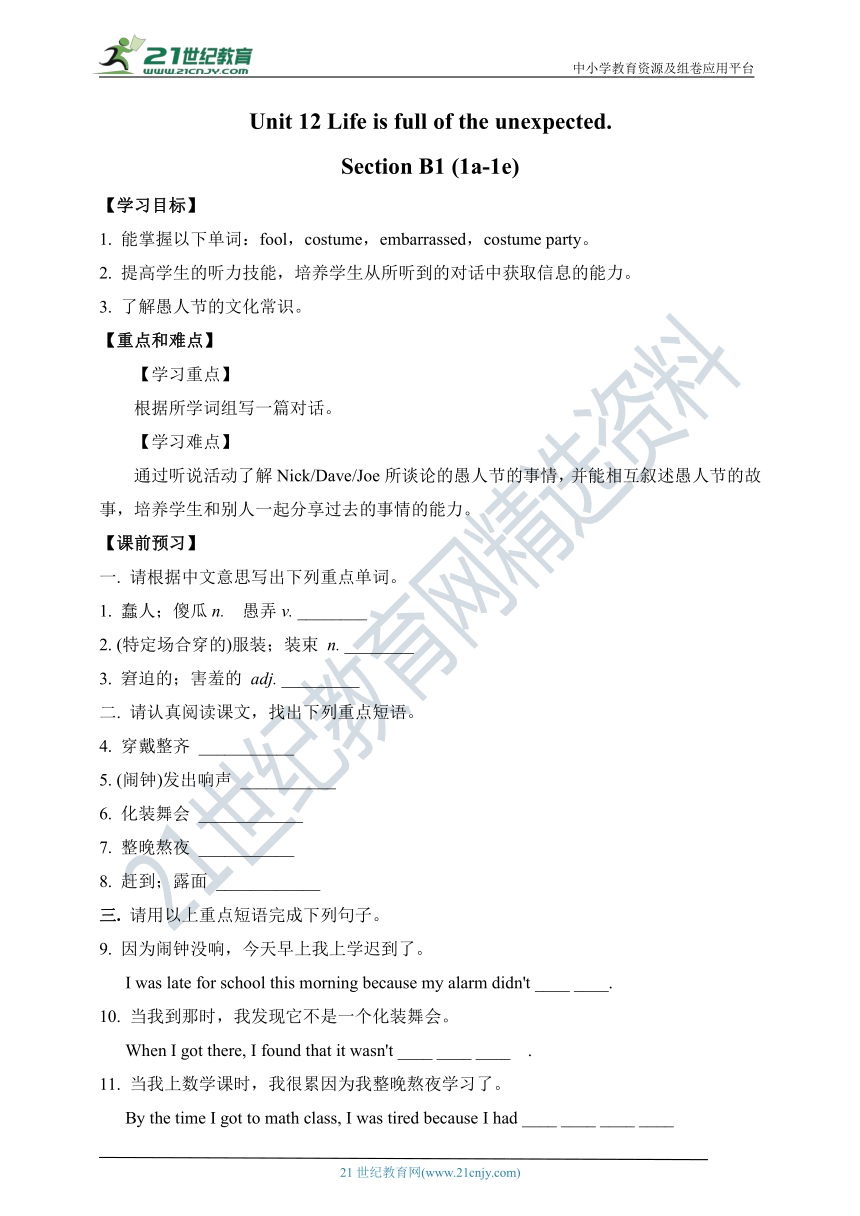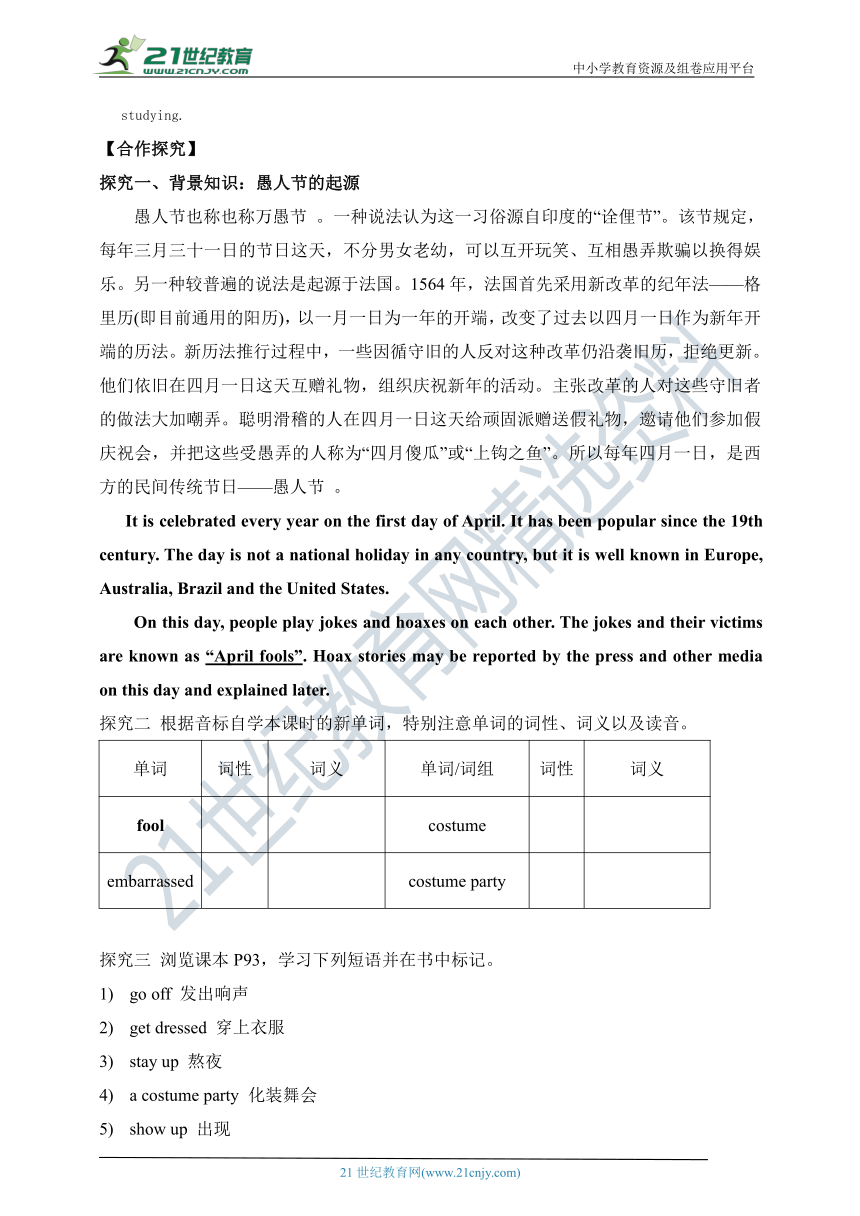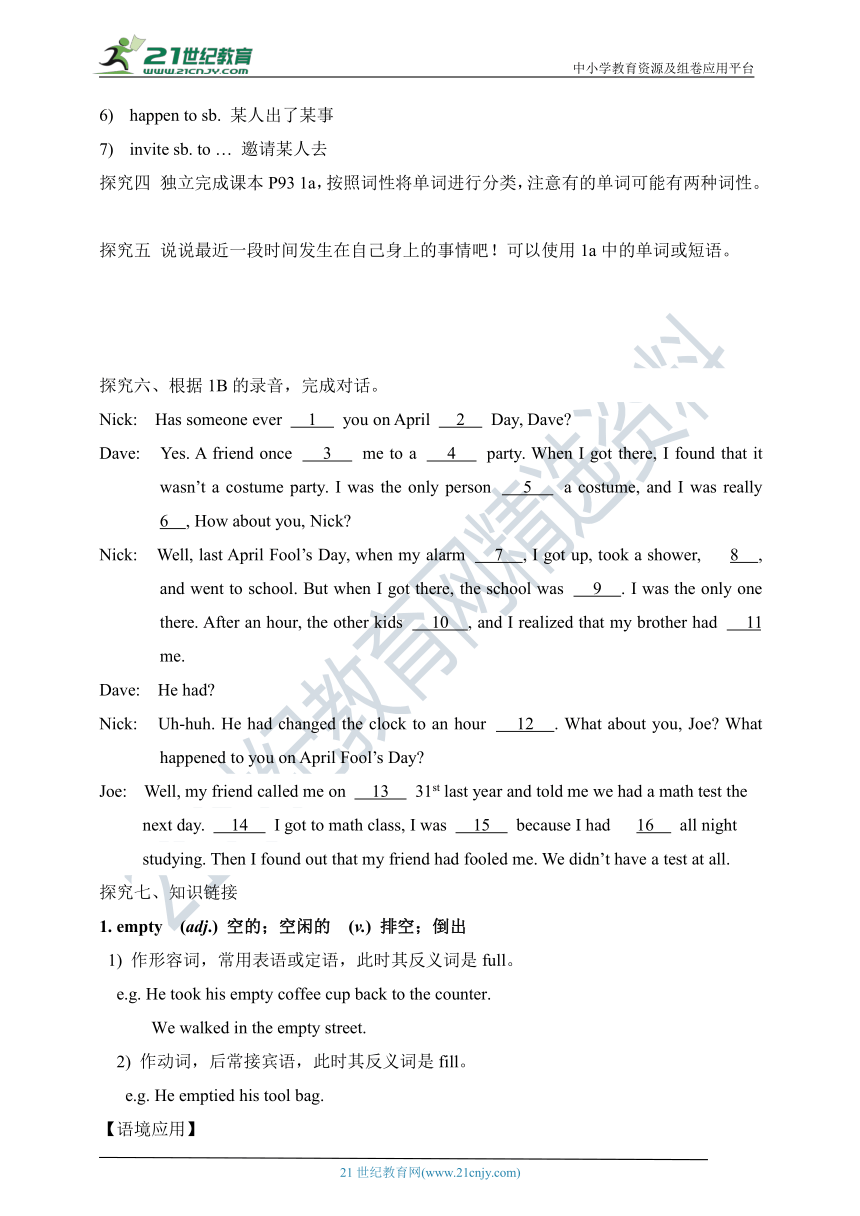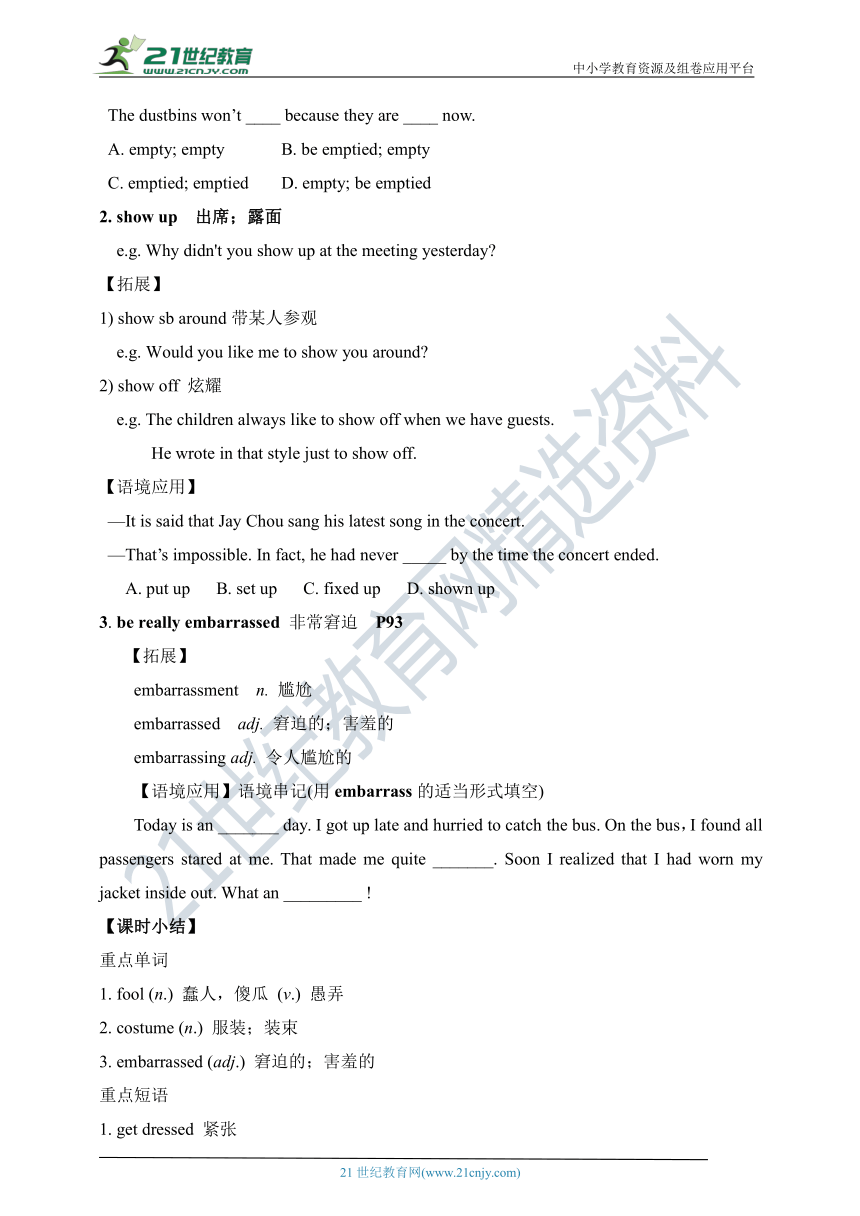Unit 12 Life is full of the unexpected.Section B1 (1a-1e) 优学案(含答案)
文档属性
| 名称 | Unit 12 Life is full of the unexpected.Section B1 (1a-1e) 优学案(含答案) |

|
|
| 格式 | zip | ||
| 文件大小 | 1.1MB | ||
| 资源类型 | 试卷 | ||
| 版本资源 | 人教新目标(Go for it)版 | ||
| 科目 | 英语 | ||
| 更新时间 | 2019-08-14 00:00:00 | ||
图片预览




文档简介
Unit 12 Life is full of the unexpected.
Section B1 (1a-1e)
【学习目标】
1. 能掌握以下单词:fool,costume,embarrassed,costume party。
2. 提高学生的听力技能,培养学生从所听到的对话中获取信息的能力。
3. 了解愚人节的文化常识。
【重点和难点】
【学习重点】
根据所学词组写一篇对话。
【学习难点】
通过听说活动了解Nick/Dave/Joe所谈论的愚人节的事情,并能相互叙述愚人节的故事,培养学生和别人一起分享过去的事情的能力。
【课前预习】
一. 请根据中文意思写出下列重点单词。
1. 蠢人;傻瓜n. 愚弄v. ________
2. (特定场合穿的)服装;装束 n. ________
3. 窘迫的;害羞的 adj. _________
二. 请认真阅读课文,找出下列重点短语。
4. 穿戴整齐 ___________
5. (闹钟)发出响声 ___________
6. 化装舞会 ____________
7. 整晚熬夜 ___________
8. 赶到;露面 ____________
三. 请用以上重点短语完成下列句子。
9. 因为闹钟没响,今天早上我上学迟到了。
I was late for school this morning because my alarm didn't ____ ____.
10. 当我到那时,我发现它不是一个化装舞会。
When I got there, I found that it wasn't ____ ____ ____ .
11. 当我上数学课时,我很累因为我整晚熬夜学习了。
By the time I got to math class, I was tired because I had ____ ____ ____ ____
studying.
【合作探究】
探究一、背景知识:愚人节的起源
愚人节也称也称万愚节 。一种说法认为这一习俗源自印度的“诠俚节”。该节规定,每年三月三十一日的节日这天,不分男女老幼,可以互开玩笑、互相愚弄欺骗以换得娱乐。另一种较普遍的说法是起源于法国。1564年,法国首先采用新改革的纪年法——格里历(即目前通用的阳历),以一月一日为一年的开端,改变了过去以四月一日作为新年开端的历法。新历法推行过程中,一些因循守旧的人反对这种改革仍沿袭旧历,拒绝更新。他们依旧在四月一日这天互赠礼物,组织庆祝新年的活动。主张改革的人对这些守旧者的做法大加嘲弄。聪明滑稽的人在四月一日这天给顽固派赠送假礼物,邀请他们参加假庆祝会,并把这些受愚弄的人称为“四月傻瓜”或“上钩之鱼”。所以每年四月一日,是西方的民间传统节日——愚人节 。
It is celebrated every year on the first day of April. It has been popular since the 19th century. The day is not a national holiday?in any country, but it is well known in Europe, Australia, Brazil and the United States.
On this day, people play?jokes?and?hoaxes on each other. The jokes and their victims are known as “April fools”. Hoax stories may be reported by the press and other media on this day and explained later.
探究二 根据音标自学本课时的新单词,特别注意单词的词性、词义以及读音。
单词
词性
词义
单词/词组
词性
词义
fool
costume
embarrassed
costume party
探究三 浏览课本P93,学习下列短语并在书中标记。
1) go off 发出响声
2) get dressed 穿上衣服
3) stay up 熬夜
4) a costume party 化装舞会
5) show up 出现
6) happen to sb. 某人出了某事
7) invite sb. to … 邀请某人去
探究四 独立完成课本P93 1a,按照词性将单词进行分类,注意有的单词可能有两种词性。
探究五 说说最近一段时间发生在自己身上的事情吧!可以使用1a中的单词或短语。
探究六、根据1B的录音,完成对话。
Nick: Has someone ever 1 you on April 2 Day, Dave?
Dave: Yes. A friend once 3 me to a 4 party. When I got there, I found that it wasn’t a costume party. I was the only person 5 a costume, and I was really 6 , How about you, Nick?
Nick: Well, last April Fool’s Day, when my alarm 7 , I got up, took a shower, 8 , and went to school. But when I got there, the school was 9 . I was the only one there. After an hour, the other kids 10 , and I realized that my brother had 11 me.
Dave: He had?
Nick: Uh-huh. He had changed the clock to an hour 12 . What about you, Joe? What happened to you on April Fool’s Day?
Joe: Well, my friend called me on 13 31st last year and told me we had a math test the next day. 14 I got to math class, I was 15 because I had 16 all night studying. Then I found out that my friend had fooled me. We didn’t have a test at all.
探究七、知识链接
1. empty (adj.) 空的;空闲的 (v.) 排空;倒出
1) 作形容词,常用表语或定语,此时其反义词是full。
e.g. He took his empty coffee cup back to the counter.
We walked in the empty street.
2) 作动词,后常接宾语,此时其反义词是fill。
e.g. He emptied his tool bag.
【语境应用】
The dustbins won’t ____ because they are ____ now.
A. empty; empty B. be emptied; empty
C. emptied; emptied D. empty; be emptied
2. show up 出席;露面
e.g. Why didn't you show up at the meeting yesterday?
【拓展】
1) show sb around带某人参观
e.g. Would you like me to show you around??
2) show off 炫耀
e.g. The children always like to show off when we have guests.?
He wrote in that style just to show off.?
【语境应用】
—It is said that Jay Chou sang his latest song in the concert.
—That’s impossible. In fact, he had never _____ by the time the concert ended.
A. put up B. set up C. fixed up D. shown up
3. be really embarrassed 非常窘迫 P93
【拓展】
embarrassment n. 尴尬
embarrassed adj. 窘迫的;害羞的
embarrassing adj. 令人尴尬的
【语境应用】语境串记(用embarrass的适当形式填空)
Today is an _______ day. I got up late and hurried to catch the bus. On the bus,I found all passengers stared at me. That made me quite _______. Soon I realized that I had worn my jacket inside out. What an _________ !
【课时小结】
重点单词
1. fool (n.) 蠢人,傻瓜 (v.) 愚弄
2. costume (n.) 服装;装束
3. embarrassed (adj.) 窘迫的;害羞的
重点短语
1. get dressed 紧张
2. show up 出现
3. costume party 化装舞会
重点句式
1.—What happened to Dave on April Fool’s Day?
—Well, a friend invited him to a costume party…
2. When I got there, I found that it wasn’t a costume party.
3. By the time I got to the math class, I was tired because I had stayed up all night
studying.
【达标检测】
一. 用所给词的适当形式或根据汉语填空。
1. What?do?you?do?on?April ________(fool)?Day??
2. He?was?________ (embarrass) when?they?kept?telling?him?how?clever?he?was.
3. This month he was late for school ________?(至少) three times.
4. There are many beautiful _________(机场)in our city.
5. Remember to keep______?(read) every day and it’s very good for you.
6. The baby cried hard and?_______(wake)?me up?this?morning.
7. You need to get?______?(dress) and go shopping with me.
二. 选择合适的短语填空,必要时需要变形。?
give?sb.?a?lift, by?the?end?of, wait?in?line?with, take?off,
end up, thousands of
1.?Luckily,?Tom?saw?me?on?the?way?to?school?and?_______________.?
2.?How?did?the?writer?______________?missing?both?events??
3.?When?we?got?to?the?foot?of?the?mountain,?____________?visitors?had?already?come.
4.?When?we?go?to?the?doctor’s,?we?should?always?_____________?other?patients.
5.?When?I?got?to the?airport,?my?plane?to?Beijing?_____________.?
6.?___________?last?term,?we?had?studied?more?than?three?thousand?words.?
【自我评价】
1. 本课我学会了什么?
________________________________________________
2. 通过本课的学习,我还有哪些疑问?
___________________________________________________
参考答案:
【课前预习】
1. fool 2. costume 3. embarrassed 4. get dressed 5. go off
6. costume party 7. stay up all night 8. show up
9. go off 10. a costume party 11. stayed up all night
探究二
单词
词性
词义
单词/词组
词性
词义
fool
n/v
蠢人;傻瓜n. 愚弄v.
costume
n
(特定场合穿的)服装;装束
embarrassed
adj
迫的;害羞的
costume party
化装舞会
探究四
名词
fool costume call change clock
动词
fool go off empty get dressed show up change tired invite
call realize stay up
形容词
embarrassed empty tired
探究五
1. I was waiting for the school bus but it didn’t come. Then I realizedit was Saturday.
2. I woke up late this morning. I had to rush to get to school on time.
3. There’s a good TV show tonight but it’s at 1:00 am. I don’t want to stay up that late.
4. Sally invited me to her birthday party. It’s at her house on Saturday.
5. Do you know where John is? He was going to meet me earlier but he didn’t show
up.
探究六
1. tricked 2. Fool's 3. invited 4. costume 5. wearing
6. embarrassed 7. went off 8. got dressed 9. empty 10. showed up
11. fooled 12. earlier 13. March 14. By the time 15. tired
16. stayed up
探究七
1. B 2. D
3. embarrassing;embarrassed;embarrassment
【达标检测】
一1. Fool’s 2. embarrassed 3. at?least 4. airports
5. reading 6. woke 7. dressed
二1.?gave me a lift 2.?end up 3.?thousands of 4. wait in line with
5.?had taken off 6.?By the end of
Section B1 (1a-1e)
【学习目标】
1. 能掌握以下单词:fool,costume,embarrassed,costume party。
2. 提高学生的听力技能,培养学生从所听到的对话中获取信息的能力。
3. 了解愚人节的文化常识。
【重点和难点】
【学习重点】
根据所学词组写一篇对话。
【学习难点】
通过听说活动了解Nick/Dave/Joe所谈论的愚人节的事情,并能相互叙述愚人节的故事,培养学生和别人一起分享过去的事情的能力。
【课前预习】
一. 请根据中文意思写出下列重点单词。
1. 蠢人;傻瓜n. 愚弄v. ________
2. (特定场合穿的)服装;装束 n. ________
3. 窘迫的;害羞的 adj. _________
二. 请认真阅读课文,找出下列重点短语。
4. 穿戴整齐 ___________
5. (闹钟)发出响声 ___________
6. 化装舞会 ____________
7. 整晚熬夜 ___________
8. 赶到;露面 ____________
三. 请用以上重点短语完成下列句子。
9. 因为闹钟没响,今天早上我上学迟到了。
I was late for school this morning because my alarm didn't ____ ____.
10. 当我到那时,我发现它不是一个化装舞会。
When I got there, I found that it wasn't ____ ____ ____ .
11. 当我上数学课时,我很累因为我整晚熬夜学习了。
By the time I got to math class, I was tired because I had ____ ____ ____ ____
studying.
【合作探究】
探究一、背景知识:愚人节的起源
愚人节也称也称万愚节 。一种说法认为这一习俗源自印度的“诠俚节”。该节规定,每年三月三十一日的节日这天,不分男女老幼,可以互开玩笑、互相愚弄欺骗以换得娱乐。另一种较普遍的说法是起源于法国。1564年,法国首先采用新改革的纪年法——格里历(即目前通用的阳历),以一月一日为一年的开端,改变了过去以四月一日作为新年开端的历法。新历法推行过程中,一些因循守旧的人反对这种改革仍沿袭旧历,拒绝更新。他们依旧在四月一日这天互赠礼物,组织庆祝新年的活动。主张改革的人对这些守旧者的做法大加嘲弄。聪明滑稽的人在四月一日这天给顽固派赠送假礼物,邀请他们参加假庆祝会,并把这些受愚弄的人称为“四月傻瓜”或“上钩之鱼”。所以每年四月一日,是西方的民间传统节日——愚人节 。
It is celebrated every year on the first day of April. It has been popular since the 19th century. The day is not a national holiday?in any country, but it is well known in Europe, Australia, Brazil and the United States.
On this day, people play?jokes?and?hoaxes on each other. The jokes and their victims are known as “April fools”. Hoax stories may be reported by the press and other media on this day and explained later.
探究二 根据音标自学本课时的新单词,特别注意单词的词性、词义以及读音。
单词
词性
词义
单词/词组
词性
词义
fool
costume
embarrassed
costume party
探究三 浏览课本P93,学习下列短语并在书中标记。
1) go off 发出响声
2) get dressed 穿上衣服
3) stay up 熬夜
4) a costume party 化装舞会
5) show up 出现
6) happen to sb. 某人出了某事
7) invite sb. to … 邀请某人去
探究四 独立完成课本P93 1a,按照词性将单词进行分类,注意有的单词可能有两种词性。
探究五 说说最近一段时间发生在自己身上的事情吧!可以使用1a中的单词或短语。
探究六、根据1B的录音,完成对话。
Nick: Has someone ever 1 you on April 2 Day, Dave?
Dave: Yes. A friend once 3 me to a 4 party. When I got there, I found that it wasn’t a costume party. I was the only person 5 a costume, and I was really 6 , How about you, Nick?
Nick: Well, last April Fool’s Day, when my alarm 7 , I got up, took a shower, 8 , and went to school. But when I got there, the school was 9 . I was the only one there. After an hour, the other kids 10 , and I realized that my brother had 11 me.
Dave: He had?
Nick: Uh-huh. He had changed the clock to an hour 12 . What about you, Joe? What happened to you on April Fool’s Day?
Joe: Well, my friend called me on 13 31st last year and told me we had a math test the next day. 14 I got to math class, I was 15 because I had 16 all night studying. Then I found out that my friend had fooled me. We didn’t have a test at all.
探究七、知识链接
1. empty (adj.) 空的;空闲的 (v.) 排空;倒出
1) 作形容词,常用表语或定语,此时其反义词是full。
e.g. He took his empty coffee cup back to the counter.
We walked in the empty street.
2) 作动词,后常接宾语,此时其反义词是fill。
e.g. He emptied his tool bag.
【语境应用】
The dustbins won’t ____ because they are ____ now.
A. empty; empty B. be emptied; empty
C. emptied; emptied D. empty; be emptied
2. show up 出席;露面
e.g. Why didn't you show up at the meeting yesterday?
【拓展】
1) show sb around带某人参观
e.g. Would you like me to show you around??
2) show off 炫耀
e.g. The children always like to show off when we have guests.?
He wrote in that style just to show off.?
【语境应用】
—It is said that Jay Chou sang his latest song in the concert.
—That’s impossible. In fact, he had never _____ by the time the concert ended.
A. put up B. set up C. fixed up D. shown up
3. be really embarrassed 非常窘迫 P93
【拓展】
embarrassment n. 尴尬
embarrassed adj. 窘迫的;害羞的
embarrassing adj. 令人尴尬的
【语境应用】语境串记(用embarrass的适当形式填空)
Today is an _______ day. I got up late and hurried to catch the bus. On the bus,I found all passengers stared at me. That made me quite _______. Soon I realized that I had worn my jacket inside out. What an _________ !
【课时小结】
重点单词
1. fool (n.) 蠢人,傻瓜 (v.) 愚弄
2. costume (n.) 服装;装束
3. embarrassed (adj.) 窘迫的;害羞的
重点短语
1. get dressed 紧张
2. show up 出现
3. costume party 化装舞会
重点句式
1.—What happened to Dave on April Fool’s Day?
—Well, a friend invited him to a costume party…
2. When I got there, I found that it wasn’t a costume party.
3. By the time I got to the math class, I was tired because I had stayed up all night
studying.
【达标检测】
一. 用所给词的适当形式或根据汉语填空。
1. What?do?you?do?on?April ________(fool)?Day??
2. He?was?________ (embarrass) when?they?kept?telling?him?how?clever?he?was.
3. This month he was late for school ________?(至少) three times.
4. There are many beautiful _________(机场)in our city.
5. Remember to keep______?(read) every day and it’s very good for you.
6. The baby cried hard and?_______(wake)?me up?this?morning.
7. You need to get?______?(dress) and go shopping with me.
二. 选择合适的短语填空,必要时需要变形。?
give?sb.?a?lift, by?the?end?of, wait?in?line?with, take?off,
end up, thousands of
1.?Luckily,?Tom?saw?me?on?the?way?to?school?and?_______________.?
2.?How?did?the?writer?______________?missing?both?events??
3.?When?we?got?to?the?foot?of?the?mountain,?____________?visitors?had?already?come.
4.?When?we?go?to?the?doctor’s,?we?should?always?_____________?other?patients.
5.?When?I?got?to the?airport,?my?plane?to?Beijing?_____________.?
6.?___________?last?term,?we?had?studied?more?than?three?thousand?words.?
【自我评价】
1. 本课我学会了什么?
________________________________________________
2. 通过本课的学习,我还有哪些疑问?
___________________________________________________
参考答案:
【课前预习】
1. fool 2. costume 3. embarrassed 4. get dressed 5. go off
6. costume party 7. stay up all night 8. show up
9. go off 10. a costume party 11. stayed up all night
探究二
单词
词性
词义
单词/词组
词性
词义
fool
n/v
蠢人;傻瓜n. 愚弄v.
costume
n
(特定场合穿的)服装;装束
embarrassed
adj
迫的;害羞的
costume party
化装舞会
探究四
名词
fool costume call change clock
动词
fool go off empty get dressed show up change tired invite
call realize stay up
形容词
embarrassed empty tired
探究五
1. I was waiting for the school bus but it didn’t come. Then I realizedit was Saturday.
2. I woke up late this morning. I had to rush to get to school on time.
3. There’s a good TV show tonight but it’s at 1:00 am. I don’t want to stay up that late.
4. Sally invited me to her birthday party. It’s at her house on Saturday.
5. Do you know where John is? He was going to meet me earlier but he didn’t show
up.
探究六
1. tricked 2. Fool's 3. invited 4. costume 5. wearing
6. embarrassed 7. went off 8. got dressed 9. empty 10. showed up
11. fooled 12. earlier 13. March 14. By the time 15. tired
16. stayed up
探究七
1. B 2. D
3. embarrassing;embarrassed;embarrassment
【达标检测】
一1. Fool’s 2. embarrassed 3. at?least 4. airports
5. reading 6. woke 7. dressed
二1.?gave me a lift 2.?end up 3.?thousands of 4. wait in line with
5.?had taken off 6.?By the end of
同课章节目录
- Unit 1 How can we become good learners.
- Section A
- Section B
- Unit 2 I think that mooncakes are delicious!
- Section A
- Section B
- Unit 3 Could you please tell me where the restroom
- Section A
- Section B
- Unit 4 I used to be afraid of the dark.
- Section A
- Section B
- Unit 5 What are the shirts made of?
- Section A
- Section B
- Review of Units 1-5
- Unit 6 When was it invented?
- Section A
- Section B
- Unit 7 Teenagers should be allowed to choose their
- Section A
- Section B
- Unit 8 It must belong to Carla.
- Section A
- Section B
- Unit 9 I like music that I can dance to.
- Section A
- Section B
- Unit 10 You're supposed to shake hands.
- Section A
- Section B
- Review of Units 6-10
- Unit 11 Sad movies make me cry.
- Section A
- Section B
- Unit 12 Life is full of the unexpected
- Section A
- Section B
- Unit 13 We're trying to save the earth!
- Section A
- Section B
- Unit 14 I remember meeting all of you in Grade 7.
- Section A
- Section B
- Review of Units 11-14
